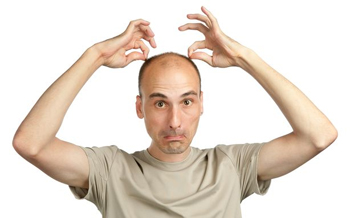London, Dec 29: A new way to trigger hair growth using human skin is offering fresh hope of a cure for baldness, scientists say.
A group from the Spanish National Cancer Research Centre (CNIO) found that cells from the immune system called macrophages - those in charge of devouring invading pathogens - are also responsible for activating skin stem cells and induce hair growth.

The regenerative ability of stem cells allows skin replenishment during a lifetime. But different factors can reduce their regenerative properties or promote their uncontrolled growth.
When things go wrong, this can lead to ageing and disease, including skin carcinomas.
The discovery that macrophages activate skin stem cells may also have further implications beyond the possibility to develop therapeutic approaches for hair loss, but may also be relevant for cancer research.
"We have discovered that macrophages, cells whose main function is traditionally attributed to fight infections and wound repair, are also involved in the activation of hair follicle stem cells in non inflamed skin," said Mirna Perez-Moreno from the Epithelial Cell Biology Group of the BBVA Foundation-CNIO Cancer Cell Biology Programme.
This work emerged more than four years ago when the mice Perez-Moreno had been working with received anti-inflammatory drugs, a treatment that also reactivated hair growth.
Perez-Moreno's lab then experimented with the different types of cells involved in the body's defence system.
After years of investigation, they discovered that when stem cells are dormant, a fraction of macrophages die, due to a process known as apoptosis.
This stimulated the secretion of factors from dying and living macrophages, which in turn activated stem cells, and that is when hair began to grow again.
Macrophages secrete a number of factors including a class of proteins called Wnt.
Researchers demonstrated the participation of macrophage-derived Wnts by artificially reproducing the natural process by treating macrophages with a Wnt inhibitor drug encapsulated in liposomes. As expected, when they used this drug, the activation of hair growth was delayed.
The discovery "may facilitate the development of novel treatment strategies" for hair growth in humans, researchers said.
The possibility of attacking one type of cell to affect another might have broader applications that go beyond "just" growing hair.
"Our study underlines the importance of macrophages as modulators in skin regenerative processes, going beyond their primary function as phagocytes [immune system cells]," researchers said.
The study was published in the journal PLOS Biology.






Comments
Thanks to my father who informed me regarding this web site, this
webpage is in fact amazing.
Feel free to visit my page :: Encante Serum: http://www.bookmrk.us/bookmark/?url=http://vivabiotics.org/encante-seru…
Add new comment